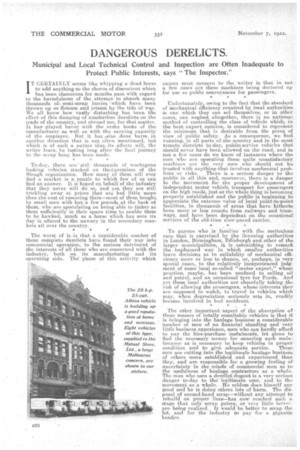DANGEROUS DERELICTS.
Page 10

If you've noticed an error in this article please click here to report it so we can fix it.
Municipal and Local Technical Control and Inspection are Often Inadequate to Protect Public Interests, says "The Inspector."
IT CERTAINLY seems like whipping a dead horse to add anything to the chorus of discontent whicrt has been clamorous for months past with regard to the harmfulness of the attempt to absorb many thousands of. semi-scrap lorries .which have been thrown up as flotsam and jetsam by the tide of war. We all know -how vastly disturbing has been the effect of this dumping of numberless derelicts on the trade of the country, and abroad too, for that matter, It has played havoh with the order books of the manufacturer as well as with the earning capacity of the employe.e. But it .has ,also .done harm in another direction that is not often mentioned, but which is of such a nature that. its effects will, the. writer fears, he lasting long after the final journey to the scrap heap has been made.
To-day, there are' still thousands of woebegone looking vehicles stacked on thepremises of the Slough .organization. How many of them will ever find a market is a puzzle to which few of us can find an answer. It is hoped on behalf of the industry that they never will .do so, and yet they are still trickling awayat prices that are buf, little more than the cost of removing them—most of them bought. by small men with but .a few pounds at the back al them, who are speculating on being able to tinker at them sufficiently in their spare time -to enable them to be hawked, muck as a horse which has seen. its
• day is offered to the unwary-in the secondarymarkets all over the country.
The worst of it.is that a Considerable number of these complete derelicts have found their way into commercial operation, to the serious detriment of the interests of all those who are concerned with the industry, both on its manufacturing and its operating side. The phase of this activity which causes most concern to the writer is that in not a few cases are these machines being doctored up for use as public conveyances for passengers. • * • *
Unfortunately, owing to the fact. that the standard of mechanical efficiency required by local authorities is one which they can set themselves, or in other cases, can neglect altogether, there is no nationai method of controlling the class of vehicle which, in the .best expect opinion, is considered to represent the. minimum that is desirable from the point of view of public safety. As a consequence, we find running, in all parts of the country and in the most -remota districts to-day, publioservice vehicles that should never have been allowed on the road, and in not a few cases do we know of instances -where the men who are operating these quite unsatisfactory machines are the very men . who should not be trusted with anything.-that involves mechanical prob lerns or risks. There is a serious danger to the public in all this and, moreover, there is a danger to the movement for the proper development of independent motor vehicle. transport for passengers on the high roads, just as the whole thing is becoming properly established and the public is beginning to appreciate the extreme value of local point-to-point facilities, in thousands of areas that have hitherto been more or less remote from railways and tramways, and have been dependent on the occasional services of the old-time slow-paced carrier.
To anyone who is familiar with the meticulous rare that is exercised. by the licensing authorities in London, Birmingham, Edinburgh and other of the larger municipalities; it is astonishing to remark the -haphazard way in which smaller authorities leave decisions as to suitability of mechanical efficiency more or less to chance, or, perhaps, in very special cases, to the relatively inexperienced judgMent :of some local so-called "motor -expert," whose practice, maybe, has been confined, to selling oil and petrol, and an occasional tyre for Fords. And yet these local authorities are cheerfully taking the risk of allowing the »assengecs, whose -interests they are supposed to watch, to travel in vehicles which may, when depreciation seriously sets in, readily became involved in bad accidents.
The other important aspect of the absorption of these masses of totally unsuitable vehicles is that it is bringing into the haulage business a considerable number of men of no financial standing and very little business experience, men: who can hardly afford to pay the hire-purchase instalments, let alone to find the necessary money for ensuring such maintenanee as is necessary to keep vehicles in proper
condition and to give adequate service. These men are nutting into the legitimate' haulage business, of others more established and experienced than they, and are responsible for a growing feeling of uncertainty in the minds of commercial men as to the usefulness of haulage contractoTs as a whole. The man who uses a derelict dugout is a very serious danger to-day to the' legitimate user, and to the movement as a whole. He seldom does himself any good and he is doing others lots of harm. The disposal of second-hand scrap—without any attempt to rebuild, on proper lines—has now reached such a stage that only scrap prices, or very little ilettP,. are being realized, would be better to scrap the lot, and for the industry to pay for a gigantic bonfire.
































